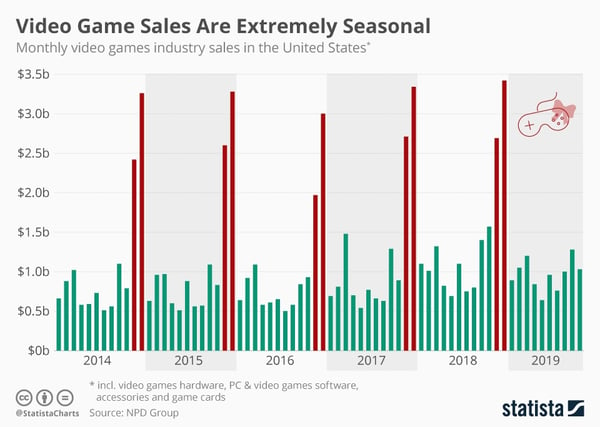Your Guide to Video Game Seasonal Marketing
by Game Marketing Genie, on 24-Nov-2020 12:05:23
Every season offers unique opportunities for companies to thrive. Even if your business is not seasonal, your customers react to different events in predictable ways you can take advantage of. Consumers tend to spend more during holiday seasons, with nearly 40 percent of online sales happening in the last three months of the year, i.e., October, November, and December (according to data from Big Commerce).
For brands wanting to connect with their audiences during Christmas time, seasonal marketing is a must. This blog post explores the impact of seasonality and how to refine your strategy as we approach the peak holiday season.
What is seasonal marketing?
Seasonal marketing is all about adjusting your marketing campaigns to current events. In other words, taking advantage of special events and holidays to connect with your audience and grow your business. Brands should look at the calendar and identify appropriate opportunities they can leverage to drive more attention to their products to boost business revenues.
The peak times for seasonal marketing are Halloween, Black Friday, Valentine's Day, Christmas, and New Year's Eve, but you shouldn’t be restricted to these “official” holidays for your seasonal campaigns. The best way to go about this is to identify the significant dates/events in your industry and find the best ways to capitalize on them.
Many businesses tend to overlook seasonal marketing, but this is a huge oversight, especially for direct-to-consumer brands. This is because customers look forward to sales on special occasions, and with the right marketing campaign, you will attract a lot of buyers for your products.

Figure 1: Monthly video game sales. Source: Statista
Studies show that video game sales are extremely seasonal, with peak spending witnessed in November and December. Therefore, your customers are gearing themselves to purchase video game content for their holiday entertainment needs, and you need a Christmas marketing plan to attract players for your game.
How to plan a seasonal marketing campaign
Planning a great seasonal campaign takes a lot of time and requires a lot of organization. Below are useful video game marketing tips that will help you get started with your campaign.
Content is key
Just like with any other marketing campaign, your messaging is important when running a seasonal campaign. To come up with the right messaging and content, think of the customer journey and the story you want to tell the public. A customer journey map highlights your customer’s experience from their initial contact with your brand to the point they become repeat customers.
You should also think of the emotions you want to stir in your audience. Use the right messaging that appeals to the emotional nature or feeling of the event. Doing this will help you create a connection with your audience and make them more respective to your messages.
Have a schedule
Timing is critical if you want to make your seasonal campaign a success. Scrambling to create high-quality posts for your social media at the last minute can lead to some bad results. That’s why you need to establish a schedule to ensure each stage of your seasonal campaign is executed perfectly.
A social media content calendar will help you keep track of the content you need to publish for social engagement. You will have more time to create your posts, and as a result, they will be more effective since they were not put together in a hurry.
With unique and engaging content, you will attract the interest of potential customers and stand out from the crowd. To keep your brand top of mind requires purposeful content, so start planning early and use a publishing calendar to ensure your posts perform at their best.
Give your online presence a seasonal makeover
When decorating your on-site premise with Christmas lights, you should also take the time to give your website and social media pages a holiday makeover to spread the festive cheer online. Update your profile picture and cover photo with seasonal elements like a pumpkin or Santa hat, depending on the holiday.
Use seasonal color palettes, such as green and red for Christmas, to remind your audience of the seasonal festivities when you publish a post on your social media pages. Ensure to stay on brand, though, since your brand's personality still needs to shine through all the festive cheer.

Promote relevant products or seasonal deals
Seasonal deals are always at the forefront of your consumers' minds. They are actively looking forward to promotions and the gifts they'll buy, so you need to promote relevant products and seasonal deals at this time.
Analyze your product offerings to see what you should focus on promoting in particular seasons. If marketed correctly, those products have the potential of driving a lot of sales at that time of the year. So, take stock of your products to identify the items your clients would be happy to buy in specific seasons and develop the best strategies to market them.
Use seasonal hashtags
Hashtags are important for social media marketing. They make it easy for social media users to find and interact with your content, thus improving your online visibility. Hashtags can also be used to source user-generated content. You can start a social media campaign where your consumers share photos or videos of themselves interacting with your products. Turn this into a contest where the post with the most engagement (likes and shares) gets a branded gift.
For your seasonal campaigns, create a seasonal hashtag and encourage your followers to use it in their social posts. You can also jump on the trending hashtags for that season to boost the chances of social media users seeing your content.
Your hashtag campaigns will only be effective when you run them on the right social media platforms.
Our blog, What Are the Best Social Media Platforms to Market Your Game On?, highlights the best channels to target for game promotions.
Ensure you have a good crisis management plan
Seasonal campaigns are delightful to plan, but sometimes, seasonal messaging doesn't go according to plan. If executed the wrong way, your messaging can turn off customers, and that's why you need a good crisis management plan for your marketing blunders.
In such situations, acting fast is very important, and a solid communication plan will allow you to respond quickly to issues that threaten your brand’s reputation. It empowers you to take action and prevent the situation from getting out of control.
Don’t be afraid to bring some humor to the table
Humor is an excellent marketing tool, and adding it to your seasonal campaign will help you build an engaged customer base. Humor can be achieved on social media through things such as captioned memes, TikTok videos, and creative wordplay. Most seasonal campaigns are festive in nature, so don't be afraid to incorporate humorous content in your social media posts.
Humor also inspires customer loyalty since users are guaranteed a great time when they land on your social media pages. So, use strategic humor to get more people to interact with your seasonal promotional campaigns and drive them through the sales funnel.
Gaming brands that killed it with seasonal content
Seasonal content is a great way for developers to keep their games fresh and interesting for players. Users download games for their entertainment value, and incorporating seasonal content will keep them returning to see what new developments have occurred in the game.
Figure 2: Ravenwood Fair Halloween-themed content. Source: Ravenwood Fair
Seasonal content also monetizes really well, and this is something the developers of Ravenwood Fair realized after introducing Halloween-themed content. The game was doing fairly well, but it was bolstered by the well-timed release of the Halloween package. A skull-cart building that was part of the Halloween theme became the top-selling in-game content, and this shows how players are excited by seasonal content.
Real Inverse's Paper Ninja also witnessed similar fortunes with its Halloween add-on content. Paper Ninja Halloween achieved more than 30,000 downloads after launch, and the subsequent number of paying users pushed the game into the US top 200 Action & Adventure chat.
These two cases prove that seasonal products are effective marketing tools in the gaming industry. It ensures players don’t get bored by getting them excited to play their favorite game with seasonal content. Work with a video game marketing agency to develop seasonal releases and additional content for your game.

Your best game marketing strategies
Hope you enjoyed this article! For more insider game marketing information, check out The Ultimate Guide to Game Marketing: Everything You Need to Know.
Producing seasonal content helps developers keep their games alive and interesting for users. Games should be fun to attract and retain players, and seasonal add-ons are a great part of this.
Designing seasonal game content is easy, but seasonal marketing isn't. Specific strategies are required for different seasons, and if you're not careful, you will alienate your consumers with your messaging.
The team at Game Marketing Genie can help you avoid this predicament. Our gaming marketing agency will adjust your marketing actions to help take advantage of the different seasons to grow your business.
Are your marketing efforts yielding the desired results? Here are the best game marketing tips to attract and retain players.


